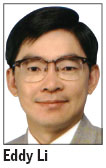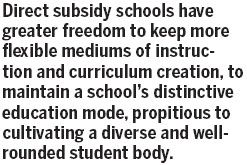More DSS schools will improve learning
Updated: 2013-05-24 06:14
By Eddy Li(HK Edition)
|
|||||||

St. Stephen's Girls' College, one of the traditional elite schools in Hong Kong, is an aided school and is now considering joining the Direct Subsidy Scheme (DSS) in the 2015-16 academic year, together with St. Stephen's Girls' Primary School. The city has paid close attention to the news: some parents worry that it will cut down the chance for students to proceed to secondary school directly without going through the central allocation process; others are concerned that the future higher tuition fee is likely to set barriers for the admittance of students from grassroots families, which is contrary to the stated school mission.
As a two-term member of the University Grants Committee once, I give my assent to supporting more schools to join the DSS, with full understanding of why some parents are concerned by the above-mentioned problems. Parents should know about the advantages of direct subsidy schools.
Regarding aspects of teaching policy, as compared with government and aided schools, direct subsidy schools have greater freedom to keep more flexible mediums of instruction and curriculum creation, to maintain a school's distinctive education mode, propitious to cultivating a diverse and well-rounded student body.
Additionally, subsidized by the Hong Kong SAR government and funded by charging students for tuition, DSS schools are abundant in teaching resources and are authorized to make their own decisions in fund usage, which precisely echoes the trend of offering diversity in Hong Kong education.

Third, parents are freer when choosing these schools, for the simple reason that DSS schools are liberated from the restrictions of the school net. Moreover, it also encourages healthy competition among teachers, by bringing more challenges to this traditionally stable and secure vocation.
Actually, students differ in terms of natural endowment, intelligence, hobby, family background, and etc., and the unitary teaching system - education guided by the core curriculum arranged by the Education Bureau - cannot cultivate students that are adaptive to the increasingly dynamic world. Various educational measures and concepts allow schools to modify their teaching methods to suit the special requirement of each class or case, so that they can bring up talents with different specialties or skills to meet the demands of the society.
As for concern over how relatively poor students can afford to pay tuition, the solution is quite easy. On one hand, a school is entitled to charge differently depending on the actual situation of a student; on the other hand, a scholarship can be set up to encourage and reward students with excellent academic scores or other specialties.
At present, there are 61 secondary schools and 21 primary schools in the Direct Subsidy Scheme in the city, taking up only 7.5 percent of Hong Kong's 1,088 schools (61 special schools excluded). This is a very low percentage representing opportunity for growth in the future.
In such circumstances, the Education Bureau should be supportive in setting up or transforming more DSS schools, to keep pace with the ever-changing situation and to improve the quality of teaching and learning.
In order to make the education industry prosperous in teaching modes, apart from the traditional DSS schools, if anyone with high aspirations and determination wants to open up a school to realize his or her education concept and doesn't need financial aid from the government, the related authorities should totally support them, by even providing lands to help them establish one.
The author is vice-president of the Chinese Manufacturers' Association of Hong Kong.
(HK Edition 05/24/2013 page1)